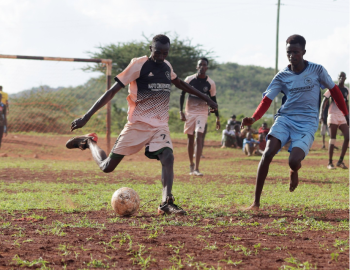Enhancing biodiversity using traditional African knowledge in Benin
Enhancing biodiversity using traditional African knowledge in Benin
This knowledge-to-action (K2A) project with Survie de la Mère et de l’Enfant (Survie), supports the resilience of local communities and ecosystems in the face of climate change in Benin through the complementary use of Indigenous and local knowledge and modern forest-protection techniques.
Context
In 2021, flooding in Bétécoucou, a village in the commune of Dassa-Zoumé, prompted the community to reconsider its environmental management approaches and explore traditional methods for protecting local forests. Benin is home to mangrove forests in the south, which are culturally sacred and protected forests in its central region. However, in recent years, sustainable agricultural practices have been overshadowed by modern methods that prioritise economic gains, such as logging activities. This shift has led to environmental degradation and increased vulnerability to climate change. Traditionally, African communities have lived in harmony with their environment. Unfortunately, the influence of external values and the temptation of short-term economic benefits have caused significant environmental damage. This degradation seriously impacts local communities that rely on ecosystems for their livelihoods.
Project activities
Survie aims to establish an exchange and collaboration between scientists, local development actors and members of the local community, including youth and women’s groups, who can work together to integrate Indigenous and local approaches into subnational ecosystem management plans. The project will:
- Document and evaluate the local environmental protection activities based on traditional knowledge.
- Support the uptake of these management plans for other communities and national government actors.
- Support the local community in making the best use of Indigenous knowledge to preserve the environment and biodiversity.
Survie has organised several meetings and workshops with local authorities, including the Prefect of the Collines Department, the six (06) Mayors and their Deputies, some District Chiefs, the Departmental Forestry Inspectorate and the Departmental Directorates, and the holders of indigenous knowledge; namely initiates, crowned heads, traditional practitioners, and babalawos.
The project launch ceremony was held on 24 June 2024, and brought together approximately 150 people from the six communes of the Collines Department: Bantè, Dassa-Zoumé, Glazoué, Savalou, Savè, and Ouessè. Crowned heads (spiritual leaders in the region) celebrated the importance of the project’s activities and engaged with young climate advocates from the community. The ceremony was captured by a local TV channel and features speeches from the different local authorities, who are committed to the project’s objectives and recognise how the project upholds Benin's cultural beliefs and values.
The project aims to gain support from local leaders to blend traditional practices with modern conservation methods and technologies, such as GIS mapping, within the local laws that govern forest management. Moreover, the project organises awareness sessions with community members to better understand their use of the forests and to explore how the initiative can promote forest conservation while protecting their livelihoods by:
- Developing a database of innovative practices to protect the environment, biodiversity and forests.
- Drafting a bill to protect biodiversity and forests for the National Assembly for consideration and vote.
Project outputs
The project has also been featured in local media outlets because of its innovative, locally aligned approaches to protecting forests.
- Feature article: Bridging Indigenous and Western knowledge systems for inclusive forest-based resilience in Benin, 2025
- Feature article: Integrating Indigenous knowledge into environmental policies for sustainable forest management in Benin, 2025
- Feature article: Traditional knowledge driving local-scale business and biodiversity conservation in Central Benin, 2026
- Afrique Numerique TV posted on August 6th, 2024
- Recovering biodiversity: A call to ancestral wisdom in the hills of Benin
- Project launch (8 mins) - July 2024
- August 2024 project awareness sessions (4 mins)
- August 2024 project awareness sessions (3 mins)

